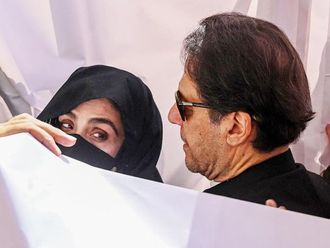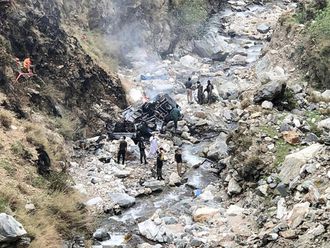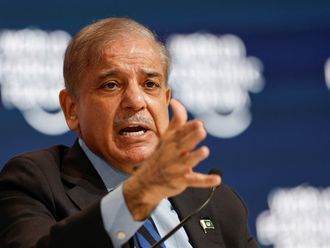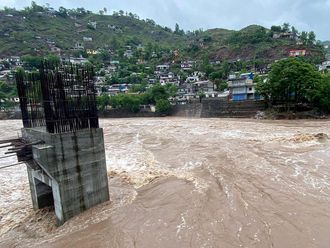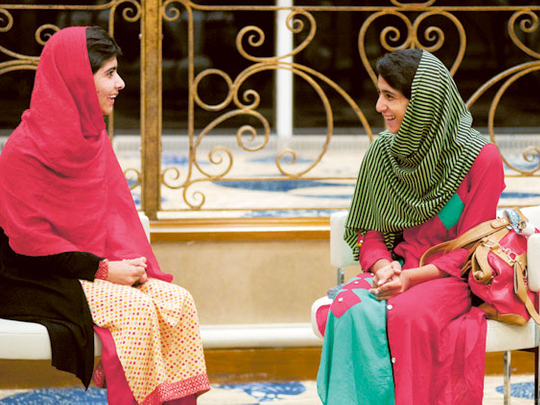
Mingora, Pakistan: Malala Yousafzai took over the United Nations on Friday, nine months after a Taliban gunman put a bullet in her head believing he was ending the Pakistani teenager’s campaign for girls’ education.
The girl will mark her 16th birthday with her first public speech since making a near miraculous recovery from the attack on a school bus near her home in Pakistan’s Swat Valley.
Doctors had to place a titanium plate over the hole in her skull and her hearing has been badly affected. But Malala has become a global superstar and a favorite to become the youngest ever Nobel Peace Prize winner.
She has already been named as one of Time magazine’s most influential people in 2013 and has reportedly secured a $3 million contract for a book on her life story.
“This frail young girl who was seriously injured has become such a powerful symbol not just for the girls’ right to education, but for the demand that we do something about it immediately,” said former British prime minister Gordon Brown, UN envoy on education who organized World Malala Day.
“There will be no compromise with any religious extremist who says girls should not go to school or stop going to school at 10,” Brown told CBS News.
Malala is expected to use her speech at a UN youth assembly to lecture UN Secretary General Ban Ki-moon and any listening world leaders on the need to keep a promise to provide universal primary education by the end of 2015.
She will also hand over a petition to Ban signed by more than 330,000 people calling on the 193 UN member states to finance teachers, schools and books to meet the education goal.
“From the day that terrible shooting - assassination attempt - took place, Malala Yousafzai is a symbol for the rights of girls, and indeed the rights of all young people, to an education,” said UN spokesman Martin Nesirky.
“And she has further underscored that symbolism through her remarkable recovery and her eloquence in explaining her case and her position,” Ban’s spokesman added.
When the Pakistani Taliban shot Malala Yousafzai in the head, their message to the world was simple: girls have no right to an education and their dreams of a better future should be crushed.
The attack portrayed the world’s only Muslim nuclear power in an appalling light as Western leaders and celebrities fell over themselves to turn Malala into a global icon of child rights.
But as she gears up to address the UN General Assembly, more girls than ever in Malala’s home, Pakistan’s northwestern Swat valley, are in school.
In the first six months of 2013, 102,374 girls registered at primary schools in Swat - compared to a total of 96,540 during all of last year, said Dilshad Bibi, Swat district education officer.
Educationalists say the influx has less to do with Malala’s fame and more to do with a growing confidence that far from being resurgent, Taliban influence is declining in Swat.
“Many people think that Malala has nothing to do with the increase in girl students in schools,” said Erfaan Hussain Babak, head teacher of a private school in the town of Saidu Sharif.
“It is because of a general awareness among the masses that girls should also be educated,” he said.
“There are many other girls who worked for education and continued their studies under the Taliban. They think that Malala was wrongly promoted by the media and was falsely hyped,” he said.
Anwar Sultana, headmistress of Government Girls High School No. 1, the oldest in Mingora, the main town in Swat, agrees.
“Many students were actually scared when the government named a college after Malala,” she said.
Last December, around 150 girls at another school protested against the renaming of their college after the injured schoolgirl, fearing it would make them a target for militants.
They tore up and stoned pictures of Malala, since nominated for the Nobel Peace prize and now being privately educated in Britain, accusing her of abandoning Pakistan.
Sultana says more girls are going to school now not because of Malala, but because people feel increasingly liberated as more time passes since the Pakistan army quashed a 2007-9 Taliban insurgency in the valley.
“Whenever you suppress something, it appears with more freedom,” Sultana said, sitting on a verandah as girls in long white shirts and baggy trousers poured out of congested classrooms.
“Now more and more girls are joining schools, which means the fear is over,” Sultana said.
At Sultana’s school, there are no desks and chairs in the dark brown, grey and orange coloured classrooms. Instead the girls sit on the floor to pack a maximum number into each room.
Saeeda Rahim, 13, is one of those girls.
The Taliban stopped her and thousands of other girls from going to school between 2007 and 2009. When the army offensive came in 2009, she and her family were forced to flee for their safety.
Displaced for three months, she spent much of the time in tears, her dreams of getting an education and becoming a doctor in tatters.
“Those days were the most difficult of my life. I lost hope and courage. I had no energy to read. I thought I’d never be able to study again,” she said.
When her family returned home, her mother initially refused to let her go back to school, fearing that she could be attacked.
Now, she is back at Government High School No 1. She covers her face with a white veil, wears the pink strip of a prefect - and says she takes inspiration from Malala.
“I really like her speeches. I want to continue her work, I want to appear in the media and convince parents that education is a right for their daughters,” she said.
There is certainly a long way to go.
Throughout Pakistan, nearly half of all children and nearly three quarters of young girls are not enrolled in primary school, according to UN and government statistics published late last year.
In Malala’s northwestern Khyber Pakhtunkhwa province, only 36 per cent of women and 72 per cent of men are literate, according to the government.
Mohammad Atif, the provincial education minister, says hardline Islamist militants have destroyed 750 schools since 2008, of which 611 have been reconstructed.
The new provincial government, led by the party of former cricketer Imran Khan, has increased its annual education budget by 27 per cent and declared female education its priority.
“Our government has allocated PRs66 billion [Dh2.42 billion], the highest amount in the provincial budget for education, and female education is our top priority,” said Atif.


